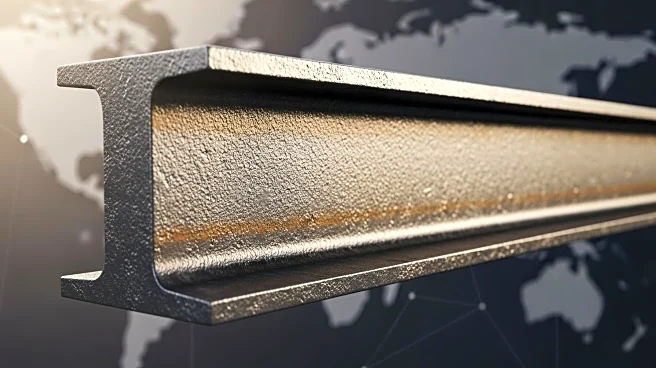What's Happening?
The UK steel industry is currently facing significant challenges due to global oversupply, high production costs, and subdued demand. Steel production in the UK has fallen to its lowest level since the 1930s,
with only 4 million tonnes produced in 2024, down from 7.6 million tonnes in 2018. This decline is compounded by an increasing dependency on imports, with 70% of steel used in the UK now being imported. The industry is also grappling with uncompetitive energy prices, as UK producers pay up to 50% more for electricity compared to their counterparts in France and Germany. The transition to electric arc furnace (EAF) technology is expected to double the sector's electricity consumption, further exacerbating cost issues. Public procurement is seen as a potential tool to support the industry, with £4.3 billion expected to be spent on steel through public projects over the next decade.
Why It's Important?
The challenges facing the UK steel industry have significant implications for the country's economy and industrial strategy. The decline in domestic steel production and increased reliance on imports threaten the sustainability of the industry, which directly contributes £1.7 billion to the economy and employs 36,800 people. The high energy costs and global oversupply put UK producers at a competitive disadvantage, potentially leading to further job losses and economic decline. The situation underscores the need for government intervention to support the industry through policy measures such as aligning procurement policies with national interests and investing in energy reforms. The transition to 'green steel' and the use of EAF technology are critical for the industry's future, but require substantial investment and policy support to be successful.
What's Next?
The UK government is expected to take steps to support the steel industry, including potential reforms in public procurement policies to prioritize domestic steel. The upcoming Defence Investment Plan and the national Steel Strategy are anticipated to outline measures to strengthen the industry's competitiveness and sustainability. The government may also consider changes to export rules for scrap metal to ensure a stable supply for domestic producers. These policy decisions will be crucial in determining whether the UK steel industry can overcome its current challenges and capitalize on future opportunities, such as the growing demand for steel in offshore wind projects and defense infrastructure.
Beyond the Headlines
The challenges facing the UK steel industry highlight broader issues related to global trade dynamics and energy policy. The industry's reliance on imports and exposure to global market fluctuations underscore the importance of developing a resilient domestic supply chain. The transition to 'green steel' also raises questions about the environmental impact of steel production and the role of government in supporting sustainable industrial practices. The situation presents an opportunity for the UK to position itself as a leader in sustainable steel production, but requires coordinated efforts from policymakers, industry stakeholders, and investors.










